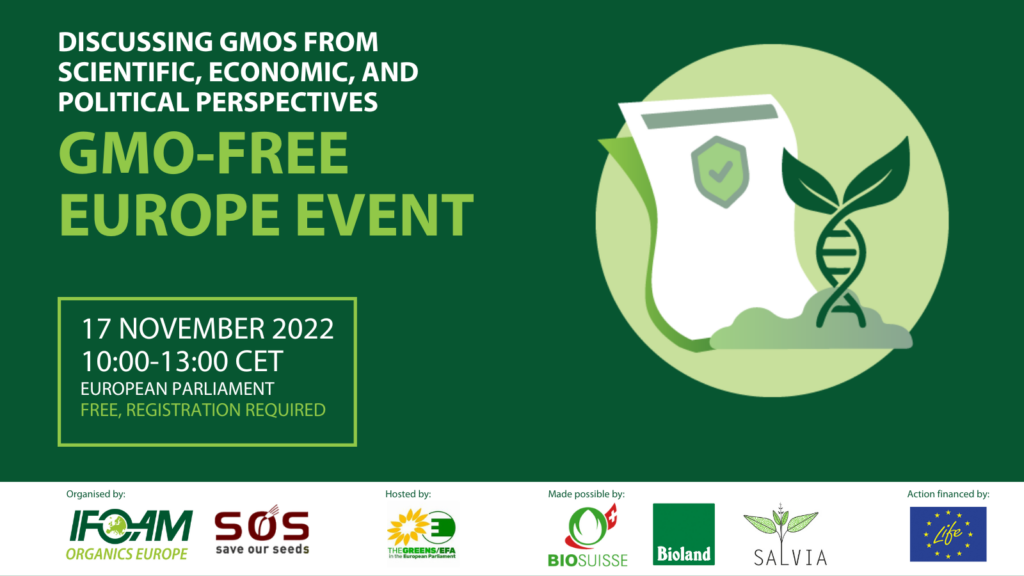Article by IFOAM Organics Europe
Worldwide, from Canada to Japan, the regulatory frameworks on genetic engineering have been either weakened or fully suspended over the past decades. Especially the new generation of genetically modified organisms (GMOs) have introduced worrying trends. Grouped under the term of “genetic editing” or “new genomic techniques” (NGTs), large corporations are increasingly developing and using novel organisms created using techniques like TALENs, Zinc Finger Nuclease or CRISPR/Cas9. The new GMOs derived from NGTs are claimed to be precise and safe. However, NGTs are powerful and interfere with the genetic mark-up of the planet’s biodiversity. They are not as precise as claimed, they trigger unwanted effects and their consequences remain poorly understood.
A striking narrative, under which NGTs are being pushed for worldwide is that they supposedly contribute to sustainability. Upon a closer look, a completely different picture emerges: few of the currently commercialised or researched GMOs actually address issues of sustainability, which generally require the modification of complex traits. Notably, climate resilience and other sustainability challenges are extremely difficult or impossible to achieve by manipulating one or a few genes. For instance, at least 60 genes have been linked to drought tolerance, further influenced by environmental conditions. Instead, GMO producers focus on modifying simple traits that help industrial agribusiness, often also producers of new herbicide and insecticide-tolerant crops. This is something we should be extremely wary of considering the problematic history of pesticide use, connected rise of pesticide resistance and biodiversity loss.
While many countries have deregulated the framework around GMOs worldwide already, the European Union (EU) has maintained a strict legislation which aims at protecting human and animal health and the environment and has the precautionary principle at heart. Doing so, the EU imposes a harmonised risk assessment procedure before any GMO can be placed on the market. It also ensures clear labelling of GMOs that are placed on the market to enable consumers and operators in the (organic) food chain to make an informed choice. The legislation also prescribes traceability of all GMOs on the market, offering a legal guarantee for operators in the food chain that their products do not contain unwanted organisms.
This stable outlook in the EU has taken a sharp turn when the European Commission declared that they are issuing a new legislative framework to govern NGTs in the 2nd quarter or 2023. It is unclear to what extent the requirements around approval, risk assessment, and risk management of the deliberate release of certain (new) GMOs into the environment will look like, as well as their use as food and feed, including labelling.
The risk of contamination threatens the GMO-free food production chain, and the economic well-being of farmers and producers. The organic movement stresses the importance of maintaining and properly implementing the current GMO legislation, including a risk assessment procedure, as well as traceability and labelling requirements.
For the organic sector, it is crucial to subject new techniques of genetic engineering to the same requirements as ‘old’ GMOs. This is essential to maintain the EU’s high standards protecting human health and the environment. Moreover, it gives the organic sector the possibility and capacity to remain GMO-free. To protect the income and livelihoods of organic farmers and processors, all contamination of non-GMO materials should be prevented by the GMO producer in line with the polluter pays principle.
In the light of the deregulation of the legislative framework on GMOs in the EU, IFOAM Organics Europe and Save Our Seeds invite you to join the debate at our GMO-free Europe Event in the European Parliament on 17 November, 10:00-13:00 CET. You can join the debate in person or remotely via a livestream. Please register to join.
We invited a wide array of stakeholders to critically discuss the topic from scientific, economic, and political perspectives. The event brings together representatives of GMO-free regions, scientists, farmers, producers, retailers, and consumers as well as NGOs, civil servants, and politicians to take a stand on the present approach and intentions and to join the debate now. Among other things, we will highlight the importance of the EU regulatory framework for the fight against GMOs in non-EU national contexts as well as issues pertaining to international trade of organic food.
The event will cover:
- The impact of deregulating food & farming and the GMO-free production chain
- Freedom of choice between GM- and non-GM products for food producers and consumers
- Input from the Commission, Members of the European Parliament, and GMO-free regions
- The scientific foundations of the Commission's initiative.
Please register to attend the GMO-free Europe event.
For further information, visit www.gmo-free-regions.org or contact: contact@gmo-free-regions.org
For help regarding the registration: events@organicseurope.bio



